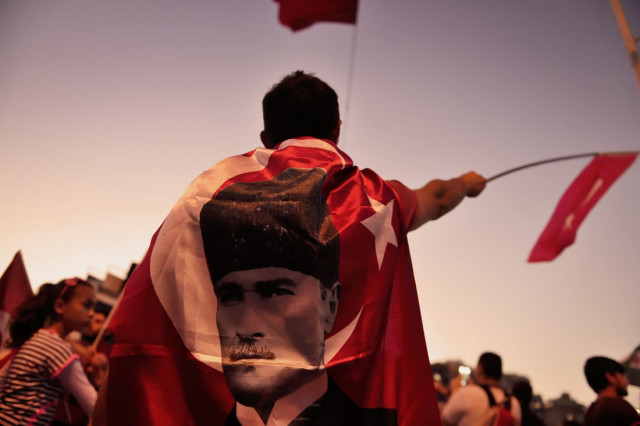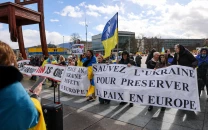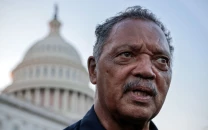Why the coup attempt failed in Turkey
The three coups in Turkey in 1960, 1971 and 1980 show a consistent pattern of military intervention after every decade

A boy is wrapped in a flag of the founder of modern Turkey Mustafa Kemal Ataturk on Taksim square on July 17, 2016, following a failed coup attempt. PHOTO: AFP
All Pakistanis stuck in Turkey return home safely, says Foreign Office
The history has evidenced number of unsuccessful coups across regions for different reasons. After the first takeover in 1958 in Sudan, the African militaries have coups every year. 80 successful coups have been recorded between 1958 and 2001, 108 unsuccessful attempts and 139 plots. Certainly many of the developing countries have a long history of crimped transition to democracy and interruption to the process of democratisation.
Political and social scientists, and economists offer different understandings and narratives in context of coups and interruption to political process. They usually study the interplay of political forces, process of democratisation, social change and principal agent problem.
Economists often derive useful interpretations of social and political problems by virtue of agency theory framework. The agency dilemma occurs when an agent acts on his own without the consent of principal and this act of him creates conflict of interest, the moral hazard.
Turkey detains 6,000 as post-coup crackdown widens
The civil-military relation in context of principal agent problem suggests two distinctive phases in Turkey’s history, first 1924-1960 where the role of military is symbolic and second 1960-2001 where the military is quite assertive. And now more recently from 2000 onwards the civil-military relationship has achieved a new symmetric balance. Military is now an agent to civilian democratic regime, the legitimate principal, which is the result of a series of constitutional reforms and consultative dialogues.
But the most recent unsuccessful attempt again posed questions to the civil-military relationship in Turkey. Does the principal agent relationship pave the way for a coup again? More interestingly, why the attempt remains unsuccessful is an important question.
Determinants of recent failure of coup in Turkey
On Pakistan’s social media and channels, broadly the two arguments, popularity of Erdogan and economic progress of Turkey are propagated as populist sentiments and potential justification for coup being unsuccessful.
Erdogan popularity among people of Turkey is unquestionable. He is very popular among the young generation of the country. He was an excellent football champion of the famous Turkish team and while being in office of the prime minister of the country he participated in a friendly match in Istanbul and scored a hat-trick. He was even riding a bicycle during the inauguration ceremony of presidential biking championship. In a number of his social media photos, he is often shown as offering prayers in public, attending public gatherings and listening to the people of his country.
He founded the Justice and Development party of Turkey in 2001 and then in March 2003 he became the prime minister of Turkey, and remained in office for 11 years until he became the first elected President of the country with more than 51% of the votes in August, 2014.
Military ‘coup’ in Turkey
Back in 2000-01 Turkey faced severe financial crises resulting in investment collapse, the GDP declined, foreign debt burden rose and the unemployment rate reached to 8.4%. The recovery started around 2002 and with fiscal consolidation, confidence in markets was restored. The impressive growth specifically during 2002-07 was direct result of macroeconomic stabilisation policies. The central bank of Turkey was granted independence formally in 2001 and the central bank gradually moved to full-fledged inflation targeting to achieve the objective of price stability, part of which made possible through fiscal tightening.
Turkey is now the 17th largest upper-middle income economy in the world. As per the World Bank’s estimates, recently in less than a decade, the per capita income has tripled, exceeding $10,500. The country is a member of Organisation for Economic Cooperation and Development and G20 and the greater integration of Turkey with EU in the last decade made it possible to benefit from rapid globalisation.
The argument of Erdogan’s popularity and economic recovery definitely has substance, but there are other factors too. Turkey has undergone series of constitutional reforms and legislations in between 1999-2010 which created a synchronised balance between civil-military relationship by restructuring and redefining the roles of Turkish military and civilian government. The sixth, seventh and eight reforms package coupled with certain legal changes made it possible to create a balance of the principal agent relationship and guaranteed more political space for democratic government.
Series of Constitutional amendments and legal reforms
In 1999, by virtue of amendment to the Article 143 of the Constitution, the military judge of state security courts was replaced by civilian.
In 2003, Article 118 was amended to redefine the scope of National Security Council (NSC) as of advisory nature besides adding four civilian members to the Council.
In 2004, Article 131 removed the military member from Higher Education Council. Under an amendment to Article 160, the Grand National Assembly provided the Court of auditors with the more authority to audit military and defence expenditures.
In 2010, Article 145 was amended and civilian courts were allowed to try military officials accused of crimes against state security. In addition, immunity to perpetrators of 1980 military coup was withdrawn through a provisional article.
The Ottoman Civil Service Law, 1913 was repealed to ensure members of security force will be held accountable if found guilty of human rights violations.
The sixth reform package in 2003 removed the NSC representative to the board of inspection of cinema, video and musical work.
People in Pakistan will celebrate, distribute sweets if army takes over: Imran
The seventh reform package of 2003 announced the secretary of NSC will be a civilian, appointed by the president upon the nomination by the prime minister. The transparency of military and defence expenditures was also increased.
Similarly, the eight reform package in 2004 too, re-adjusted the balance of power between civil-military relationship.
The economic performance of democratic government, constitutional and legal reforms to redefine the balance of power between institutions has been the key deriver of Turkey’s rise in last decade. So, the unexpected failure of recent coup attempt is not due to Erdogan’s popularity alone, rather the performance of civilian government on economic fronts and constitutional reforms have brought about a balance between civil-military, the principal agent relationship, which increased the political space for democratic government. The recent solidarity of masses with civilian government has revalidated their conviction in democracy and smooth civil-military relations.
The writer is a PhD Scholar at IBA, Karachi.



















COMMENTS
Comments are moderated and generally will be posted if they are on-topic and not abusive.
For more information, please see our Comments FAQ